Matei Zaharia
Let the Barbarians In: How AI Can Accelerate Systems Performance Research
Dec 22, 2025Abstract:Artificial Intelligence (AI) is beginning to transform the research process by automating the discovery of new solutions. This shift depends on the availability of reliable verifiers, which AI-driven approaches require to validate candidate solutions. Research focused on improving systems performance is especially well-suited to this paradigm because system performance problems naturally admit such verifiers: candidates can be implemented in real systems or simulators and evaluated against predefined workloads. We term this iterative cycle of generation, evaluation, and refinement AI-Driven Research for Systems (ADRS). Using several open-source ADRS instances (i.e., OpenEvolve, GEPA, and ShinkaEvolve), we demonstrate across ten case studies (e.g., multi-region cloud scheduling, mixture-of-experts load balancing, LLM-based SQL, transaction scheduling) that ADRS-generated solutions can match or even outperform human state-of-the-art designs. Based on these findings, we outline best practices (e.g., level of prompt specification, amount of feedback, robust evaluation) for effectively using ADRS, and we discuss future research directions and their implications. Although we do not yet have a universal recipe for applying ADRS across all of systems research, we hope our preliminary findings, together with the challenges we identify, offer meaningful guidance for future work as researcher effort shifts increasingly toward problem formulation and strategic oversight. Note: This paper is an extension of our prior work [14]. It adds extensive evaluation across multiple ADRS frameworks and provides deeper analysis and insights into best practices.
DeepScholar-Bench: A Live Benchmark and Automated Evaluation for Generative Research Synthesis
Aug 27, 2025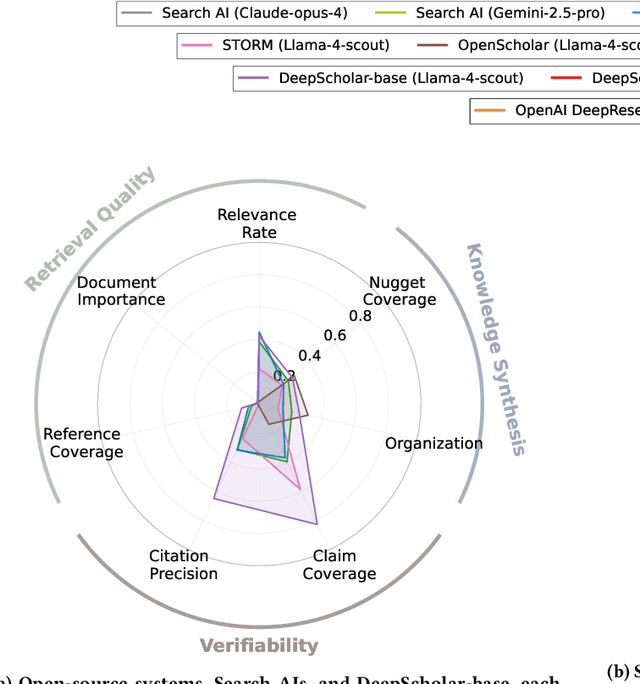
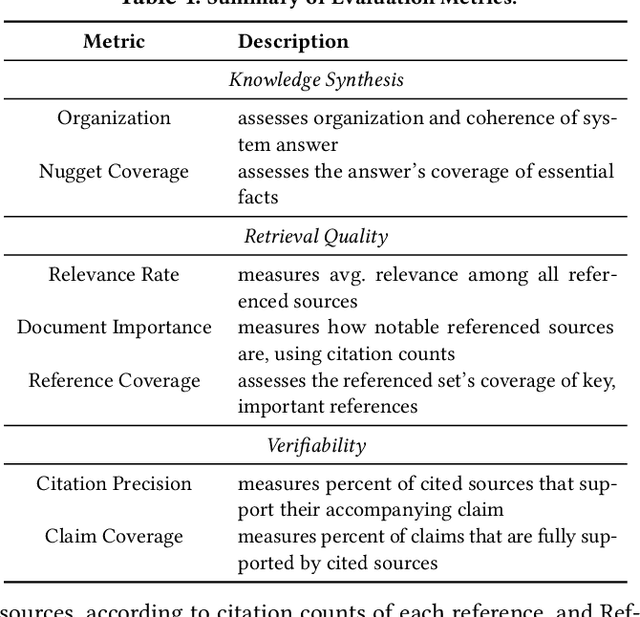
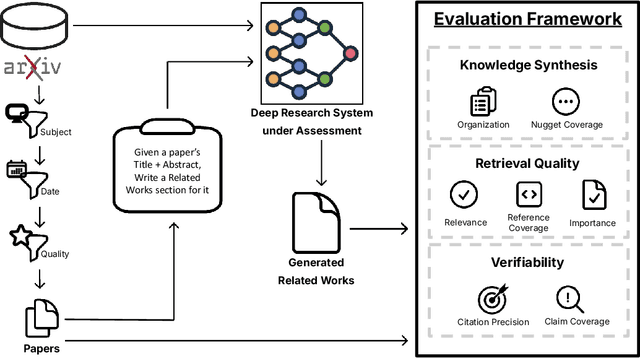
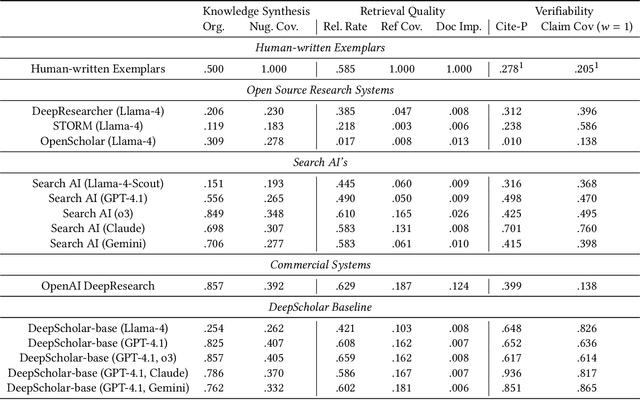
Abstract:The ability to research and synthesize knowledge is central to human expertise and progress. An emerging class of systems promises these exciting capabilities through generative research synthesis, performing retrieval over the live web and synthesizing discovered sources into long-form, cited summaries. However, evaluating such systems remains an open challenge: existing question-answering benchmarks focus on short-form factual responses, while expert-curated datasets risk staleness and data contamination. Both fail to capture the complexity and evolving nature of real research synthesis tasks. In this work, we introduce DeepScholar-bench, a live benchmark and holistic, automated evaluation framework designed to evaluate generative research synthesis. DeepScholar-bench draws queries from recent, high-quality ArXiv papers and focuses on a real research synthesis task: generating the related work sections of a paper by retrieving, synthesizing, and citing prior research. Our evaluation framework holistically assesses performance across three key dimensions, knowledge synthesis, retrieval quality, and verifiability. We also develop DeepScholar-base, a reference pipeline implemented efficiently using the LOTUS API. Using the DeepScholar-bench framework, we perform a systematic evaluation of prior open-source systems, search AI's, OpenAI's DeepResearch, and DeepScholar-base. We find that DeepScholar-base establishes a strong baseline, attaining competitive or higher performance than each other method. We also find that DeepScholar-bench remains far from saturated, with no system exceeding a score of $19\%$ across all metrics. These results underscore the difficulty of DeepScholar-bench, as well as its importance for progress towards AI systems capable of generative research synthesis. We make our code available at https://github.com/guestrin-lab/deepscholar-bench.
Multi-module GRPO: Composing Policy Gradients and Prompt Optimization for Language Model Programs
Aug 06, 2025Abstract:Group Relative Policy Optimization (GRPO) has proven to be an effective tool for post-training language models (LMs). However, AI systems are increasingly expressed as modular programs that mix together multiple LM calls with distinct prompt templates and other tools, and it is not clear how best to leverage GRPO to improve these systems. We begin to address this challenge by defining mmGRPO, a simple multi-module generalization of GRPO that groups LM calls by module across rollouts and handles variable-length and interrupted trajectories. We find that mmGRPO, composed with automatic prompt optimization, improves accuracy by 11% on average across classification, many-hop search, and privacy-preserving delegation tasks against the post-trained LM, and by 5% against prompt optimization on its own. We open-source mmGRPO in DSPy as the dspy.GRPO optimizer.
Establishing Best Practices for Building Rigorous Agentic Benchmarks
Jul 03, 2025
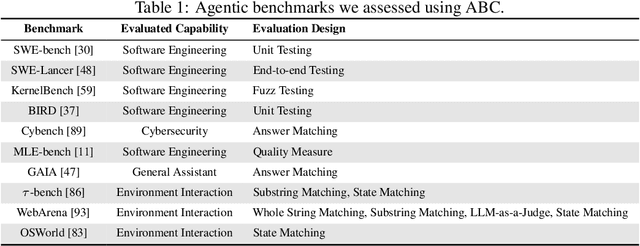

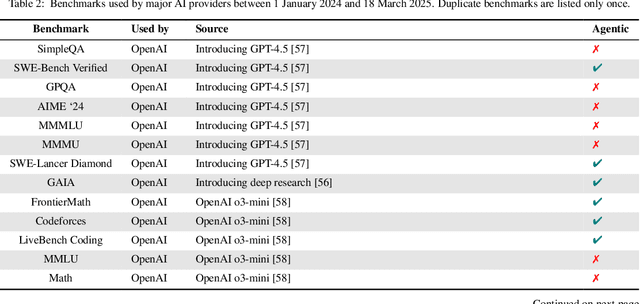
Abstract:Benchmarks are essential for quantitatively tracking progress in AI. As AI agents become increasingly capable, researchers and practitioners have introduced agentic benchmarks to evaluate agents on complex, real-world tasks. These benchmarks typically measure agent capabilities by evaluating task outcomes via specific reward designs. However, we show that many agentic benchmarks have issues task setup or reward design. For example, SWE-bench Verified uses insufficient test cases, while TAU-bench counts empty responses as successful. Such issues can lead to under- or overestimation agents' performance by up to 100% in relative terms. To make agentic evaluation rigorous, we introduce the Agentic Benchmark Checklist (ABC), a set of guidelines that we synthesized from our benchmark-building experience, a survey of best practices, and previously reported issues. When applied to CVE-Bench, a benchmark with a particularly complex evaluation design, ABC reduces the performance overestimation by 33%.
LEANN: A Low-Storage Vector Index
Jun 09, 2025Abstract:Embedding-based search is widely used in applications such as recommendation and retrieval-augmented generation (RAG). Recently, there is a growing demand to support these capabilities over personal data stored locally on devices. However, maintaining the necessary data structure associated with the embedding-based search is often infeasible due to its high storage overhead. For example, indexing 100 GB of raw data requires 150 to 700 GB of storage, making local deployment impractical. Reducing this overhead while maintaining search quality and latency becomes a critical challenge. In this paper, we present LEANN, a storage-efficient approximate nearest neighbor (ANN) search index optimized for resource-constrained personal devices. LEANN combines a compact graph-based structure with an efficient on-the-fly recomputation strategy to enable fast and accurate retrieval with minimal storage overhead. Our evaluation shows that LEANN reduces index size to under 5% of the original raw data, achieving up to 50 times smaller storage than standard indexes, while maintaining 90% top-3 recall in under 2 seconds on real-world question answering benchmarks.
EXP-Bench: Can AI Conduct AI Research Experiments?
May 30, 2025



Abstract:Automating AI research holds immense potential for accelerating scientific progress, yet current AI agents struggle with the complexities of rigorous, end-to-end experimentation. We introduce EXP-Bench, a novel benchmark designed to systematically evaluate AI agents on complete research experiments sourced from influential AI publications. Given a research question and incomplete starter code, EXP-Bench challenges AI agents to formulate hypotheses, design and implement experimental procedures, execute them, and analyze results. To enable the creation of such intricate and authentic tasks with high-fidelity, we design a semi-autonomous pipeline to extract and structure crucial experimental details from these research papers and their associated open-source code. With the pipeline, EXP-Bench curated 461 AI research tasks from 51 top-tier AI research papers. Evaluations of leading LLM-based agents, such as OpenHands and IterativeAgent on EXP-Bench demonstrate partial capabilities: while scores on individual experimental aspects such as design or implementation correctness occasionally reach 20-35%, the success rate for complete, executable experiments was a mere 0.5%. By identifying these bottlenecks and providing realistic step-by-step experiment procedures, EXP-Bench serves as a vital tool for future AI agents to improve their ability to conduct AI research experiments. EXP-Bench is open-sourced at https://github.com/Just-Curieous/Curie/tree/main/benchmark/exp_bench.
ColBERT-serve: Efficient Multi-Stage Memory-Mapped Scoring
Apr 21, 2025Abstract:We study serving retrieval models, specifically late interaction models like ColBERT, to many concurrent users at once and under a small budget, in which the index may not fit in memory. We present ColBERT-serve, a novel serving system that applies a memory-mapping strategy to the ColBERT index, reducing RAM usage by 90% and permitting its deployment on cheap servers, and incorporates a multi-stage architecture with hybrid scoring, reducing ColBERT's query latency and supporting many concurrent queries in parallel.
Reasoning Models Can Be Effective Without Thinking
Apr 14, 2025Abstract:Recent LLMs have significantly improved reasoning capabilities, primarily by including an explicit, lengthy Thinking process as part of generation. In this paper, we question whether this explicit thinking is necessary. Using the state-of-the-art DeepSeek-R1-Distill-Qwen, we find that bypassing the thinking process via simple prompting, denoted as NoThinking, can be surprisingly effective. When controlling for the number of tokens, NoThinking outperforms Thinking across a diverse set of seven challenging reasoning datasets--including mathematical problem solving, formal theorem proving, and coding--especially in low-budget settings, e.g., 51.3 vs. 28.9 on ACM 23 with 700 tokens. Notably, the performance of NoThinking becomes more competitive with pass@k as k increases. Building on this observation, we demonstrate that a parallel scaling approach that uses NoThinking to generate N outputs independently and aggregates them is highly effective. For aggregation, we use task-specific verifiers when available, or we apply simple best-of-N strategies such as confidence-based selection. Our method outperforms a range of baselines with similar latency using Thinking, and is comparable to Thinking with significantly longer latency (up to 9x). Together, our research encourages a reconsideration of the necessity of lengthy thinking processes, while also establishing a competitive reference for achieving strong reasoning performance in low-budget settings or at low latency using parallel scaling.
Why Do Multi-Agent LLM Systems Fail?
Mar 17, 2025Abstract:Despite growing enthusiasm for Multi-Agent Systems (MAS), where multiple LLM agents collaborate to accomplish tasks, their performance gains across popular benchmarks remain minimal compared to single-agent frameworks. This gap highlights the need to analyze the challenges hindering MAS effectiveness. In this paper, we present the first comprehensive study of MAS challenges. We analyze five popular MAS frameworks across over 150 tasks, involving six expert human annotators. We identify 14 unique failure modes and propose a comprehensive taxonomy applicable to various MAS frameworks. This taxonomy emerges iteratively from agreements among three expert annotators per study, achieving a Cohen's Kappa score of 0.88. These fine-grained failure modes are organized into 3 categories, (i) specification and system design failures, (ii) inter-agent misalignment, and (iii) task verification and termination. To support scalable evaluation, we integrate MASFT with LLM-as-a-Judge. We also explore if identified failures could be easily prevented by proposing two interventions: improved specification of agent roles and enhanced orchestration strategies. Our findings reveal that identified failures require more complex solutions, highlighting a clear roadmap for future research. We open-source our dataset and LLM annotator.
LangProBe: a Language Programs Benchmark
Feb 27, 2025
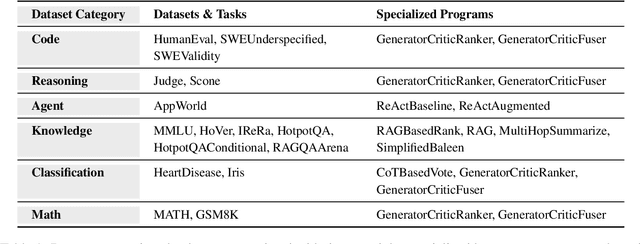
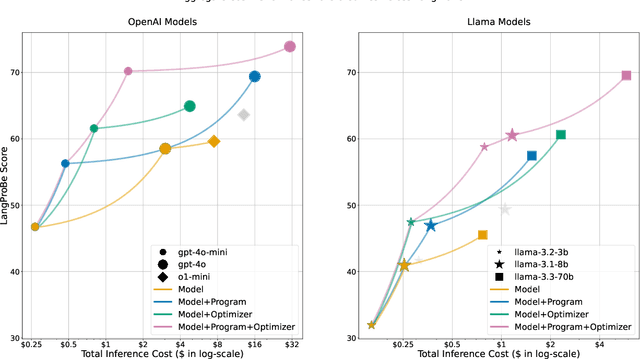
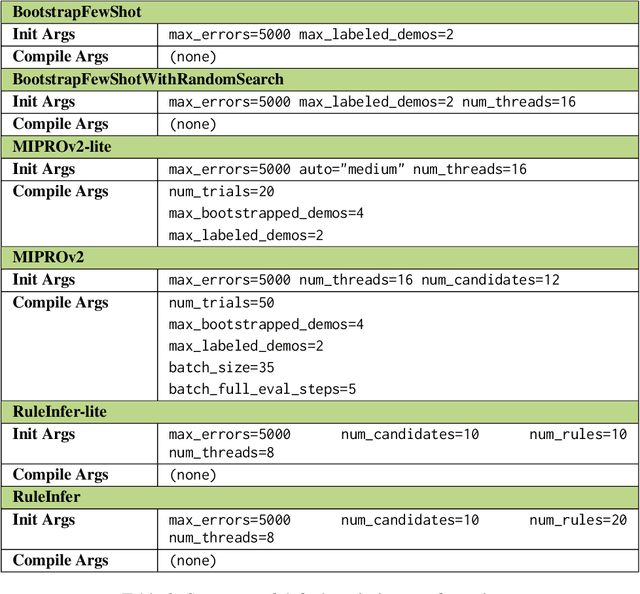
Abstract:Composing language models (LMs) into multi-step language programs and automatically optimizing their modular prompts is now a mainstream paradigm for building AI systems, but the tradeoffs in this space have only scarcely been studied before. We introduce LangProBe, the first large-scale benchmark for evaluating the architectures and optimization strategies for language programs, with over 2000 combinations of tasks, architectures, optimizers, and choices of LMs. Using LangProBe, we are the first to study the impact of program architectures and optimizers (and their compositions together and with different models) on tradeoffs of quality and cost. We find that optimized language programs offer strong cost--quality Pareto improvement over raw calls to models, but simultaneously demonstrate that human judgment (or empirical decisions) about which compositions to pursue is still necessary for best performance. We will open source the code and evaluation data for LangProBe.
 Add to Chrome
Add to Chrome Add to Firefox
Add to Firefox Add to Edge
Add to Edge